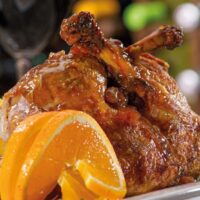Take the oranges and remove the orange part of the skin in strips with a vegetable peeler. Cut into juliennes. Simmer for 15 minutes in a litre of water. Drain. Pat dry in paper towels.
Season the duck cavity with salt and pepper, add a third of the prepared orange peel, and truss the duck.
Next, prepare the duck, which you will be roasting for an hour and 30 minutes altogether. First season the inside of the duck with salt and pepper. Prick the skin around the thighs, back and lower breast. Dry the duck thoroughly. Place it breast-up in a roasting tin and roast for 15 minutes at 220°C (425°F/ Gas Mark 7) to brown lightly.
Reduce oven to 180°C (350°F/ Gas Mark 4), and turn the duck on its side. Regulate the heat so the duck is making cooking noises but the fat is not burning. Remove the accumulated fat occasionally with a bulb baster.
About 30 minutes later, turn the duck on its other side. Fifteen minutes before the end of the estimated roasting time, salt the duck and turn it breast up.
While the duck is roasting, make a sweet-and-sour caramel colouring. Boil the sugar and vinegar over moderately high heat for several minutes until the mixture has turned into a mahogany brown syrup.
Immediately remove from the heat and pour in 120ml (1/4 pint) of duck stock. Simmer for a minute, stirring, to dissolve the caramel. Then add the rest of the stock, beat in the arrowroot mixture, and stir in the orange peel.
Simmer for three to four minutes, or until the sauce is clear, limpid and lightly thickened. Season to taste and set aside.
Cut the four oranges into neat, skinless segments and place in a covered dish.
When the duck is done, discard the trussing strings and set it on a platter. Place it in the turned-off hot oven, leaving the door ajar.
Remove as much fat as you can from the roasting tin. Add the wine and boil it down rapidly, scraping up the roasting juices and reducing the liquid to two or three tablespoons.
Strain the wine reduction into the sauce base and bring to a simmer. Stir in the orange liqueur by spoonfuls, tasting. The sauce should have a pleasant orange flavour, but not be too sweet. Add a few drops of orange bitters or lemon juice if needed.
Just before serving, and off heat, swirl in the butter enrichment, and pour the sauce into a warmed sauce boat.
Place a line of orange segments along the length of the duck and heap the rest at the two ends of the platter. Spoon a bit of sauce with peel over the duck, and serve.
